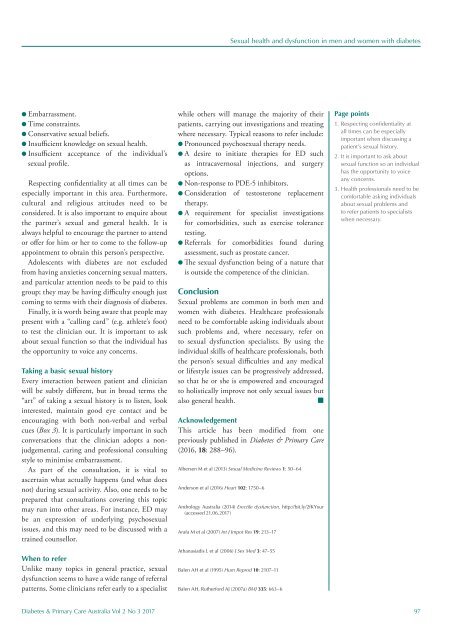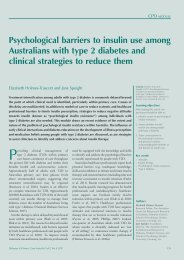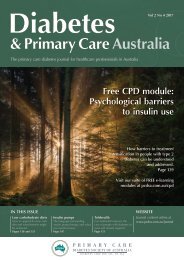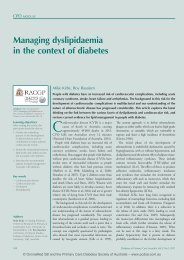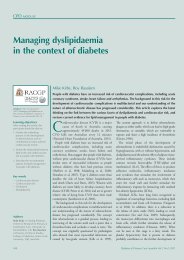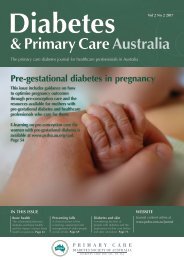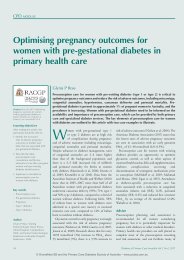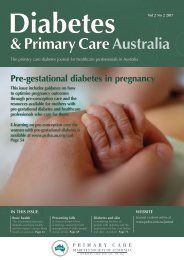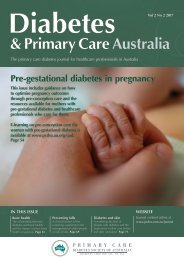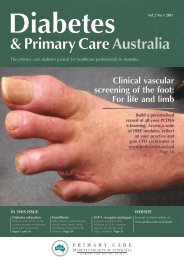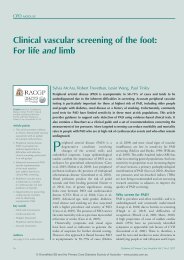DPCA 2-3_entire_v3
Create successful ePaper yourself
Turn your PDF publications into a flip-book with our unique Google optimized e-Paper software.
Sexual health and dysfunction in men and women with diabetes<br />
l Embarrassment.<br />
l Time constraints.<br />
l Conservative sexual beliefs.<br />
l Insufficient knowledge on sexual health.<br />
l Insufficient acceptance of the individual’s<br />
sexual profile.<br />
Respecting confidentiality at all times can be<br />
especially important in this area. Furthermore,<br />
cultural and religious attitudes need to be<br />
considered. It is also important to enquire about<br />
the partner’s sexual and general health. It is<br />
always helpful to encourage the partner to attend<br />
or offer for him or her to come to the follow-up<br />
appointment to obtain this person’s perspective.<br />
Adolescents with diabetes are not excluded<br />
from having anxieties concerning sexual matters,<br />
and particular attention needs to be paid to this<br />
group; they may be having difficulty enough just<br />
coming to terms with their diagnosis of diabetes.<br />
Finally, it is worth being aware that people may<br />
present with a “calling card” (e.g. athlete’s foot)<br />
to test the clinician out. It is important to ask<br />
about sexual function so that the individual has<br />
the opportunity to voice any concerns.<br />
Taking a basic sexual history<br />
Every interaction between patient and clinician<br />
will be subtly different, but in broad terms the<br />
“art” of taking a sexual history is to listen, look<br />
interested, maintain good eye contact and be<br />
encouraging with both non-verbal and verbal<br />
cues (Box 3). It is particularly important in such<br />
conversations that the clinician adopts a nonjudgemental,<br />
caring and professional consulting<br />
style to minimise embarrassment.<br />
As part of the consultation, it is vital to<br />
ascertain what actually happens (and what does<br />
not) during sexual activity. Also, one needs to be<br />
prepared that consultations covering this topic<br />
may run into other areas. For instance, ED may<br />
be an expression of underlying psychosexual<br />
issues, and this may need to be discussed with a<br />
trained counsellor.<br />
When to refer<br />
Unlike many topics in general practice, sexual<br />
dysfunction seems to have a wide range of referral<br />
patterns. Some clinicians refer early to a specialist<br />
while others will manage the majority of their<br />
patients, carrying out investigations and treating<br />
where necessary. Typical reasons to refer include:<br />
l Pronounced psychosexual therapy needs.<br />
l A desire to initiate therapies for ED such<br />
as intracavernosal injections, and surgery<br />
options.<br />
l Non-response to PDE-5 inhibitors.<br />
l Consideration of testosterone replacement<br />
therapy.<br />
l A requirement for specialist investigations<br />
for comorbidities, such as exercise tolerance<br />
testing.<br />
l Referrals for comorbidities found during<br />
assessment, such as prostate cancer.<br />
l The sexual dysfunction being of a nature that<br />
is outside the competence of the clinician.<br />
Conclusion<br />
Sexual problems are common in both men and<br />
women with diabetes. Healthcare professionals<br />
need to be comfortable asking individuals about<br />
such problems and, where necessary, refer on<br />
to sexual dysfunction specialists. By using the<br />
individual skills of healthcare professionals, both<br />
the person’s sexual difficulties and any medical<br />
or lifestyle issues can be progressively addressed,<br />
so that he or she is empowered and encouraged<br />
to holistically improve not only sexual issues but<br />
also general health. <br />
n<br />
Acknowledgement<br />
This article has been modified from one<br />
previously published in Diabetes & Primary Care<br />
(2016, 18: 288–96).<br />
Albersen M et al (2013) Sexual Medicine Reviews 1: 50–64<br />
Anderson et al (2016) Heart 102: 1750–6<br />
Andrology Australia (2014) Erectile dysfunction. http://bit.ly/2fKYxur<br />
(accessed 21.06.2017)<br />
Arafa M et al (2007) Int J Impot Res 19: 213–17<br />
Athanasiadis L et al (2006) J Sex Med 3: 47–55<br />
Balen AH et al (1995) Hum Reprod 10: 2107–11<br />
Balen AH, Rutherford AJ (2007a) BMJ 335: 663–6<br />
Page points<br />
1. Respecting confidentiality at<br />
all times can be especially<br />
important when discussing a<br />
patient’s sexual history.<br />
2. It is important to ask about<br />
sexual function so an individual<br />
has the opportunity to voice<br />
any concerns.<br />
3. Health professionals need to be<br />
comfortable asking individuals<br />
about sexual problems and<br />
to refer patients to specialists<br />
when necessary.<br />
Diabetes & Primary Care Australia Vol 2 No 3 2017 97


